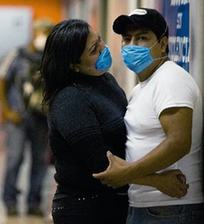墨西哥流感疫情近日有所緩解,之前實行公共活動禁令的學(xué)校、酒吧、影院等公共場所于本周四重新開放。但是衛(wèi)生部門官員表示,現(xiàn)在還不是歡呼勝利的時候,疫情還需進一步控制。到目前為止,墨西哥已有1160人感染流感病毒,其中44人死亡。墨西哥境外感染流感病毒死亡的有2人,且均在美國;全世界有23個國家的2099人感染該病毒。世界衛(wèi)生組織官員發(fā)出警告,表示此次甲型H1N1病毒有可能會在今年下半年隨著北半球流感季節(jié)的到來而更加肆虐。

 |
|
Mexico's schools, bars and cinemas reopened under strict health controls Thursday after the swine flu crisis eased, but world health chiefs warned they had still to get a handle on the epidemic.
|
Mexico's schools, bars and cinemas reopened under strict health controls Thursday after the swine flu crisis eased, but world health chiefs warned they had still to get a handle on the epidemic.
High schools and universities reopened in Mexico, the day after offices and restaurants were cleared to restart business after a five-day enforced closure in a bid to contain the outbreak.
"Fortunately, we've managed to stop the dangerous expansion the virus could have had," President Felipe Calderon said during a hospital visit.
However, he added, "it's not time to shout victory," warning there would be more cases.
Hours later, Health Minister Jose Angel Cordova announced two more dead and 90 more cases, bringing the total to 44 dead among the 1,160 infected. But the number of cases was on the wane, having peaked last week, he added.
Only two other deaths have been recorded outside Mexico -- both in the United States.
But Keiji Fukuda, acting director-general of the UN's World Health Organisation, warned the A(H1N1) virus could become more virulent later in the year with the onset of the northern hemisphere's flu season.
"It is critical for countries to maintain their alertness and monitoring so this evolution can be followed as closely as possible," he said in a video conference in Bangkok.
"We don't believe we have fully got a handle on the severity of the phenomenon."
The latest WHO figures show 2,099 cases of influenza A(H1N1) infections have been reported by 23 countries.
"Complacency is the greatest danger," said Fukuda. "It does appear to be a period where the virus maybe seeding itself in various parts of the world.
"What we are seeing now is milder than in 1918 (when up to 50 million people died of the Spanish influenza pandemic). But 1918 started mild in springtime and became more severe in winter."
The emergence of the virus, a new strain that has combined human, swine and bird influenza, set off fears of a worldwide pandemic, even though the death toll has been relatively low.
Countries have imposed a range of measures to prevent a global outbreak, especially hitting the tourism and travel industries.
Restrictions have also been placed on meat imports, not only in Mexico but also Canada and the United States.
Scientists meanwhile stressed the importance of preventing the new swine flu virus from infecting patients already sick with the deadly H5N1 avian flu, particularly in Asia.
"If both viruses wind up in the same individual, they could mix genes and mutate into a form that is both very pathogenic and easily transmitted among humans," John Oxford, a virologist at London Queen Mary's School of Medicine and Dentistry, told AFP.
Pierre Duplessis, Special Envoy for pandemic influenza at the International Federation of Red Cross and Red Crescent Societies, agreed.
"The danger of a genetic recombination is real, in animals and in humans -- this is something we fear," he said.
相關(guān)閱讀
墨西哥豬流感+地震 禍不單行
美國:創(chuàng)意口罩迎戰(zhàn)流感恐慌
(Agencies)

(英語點津 Helen 編輯)